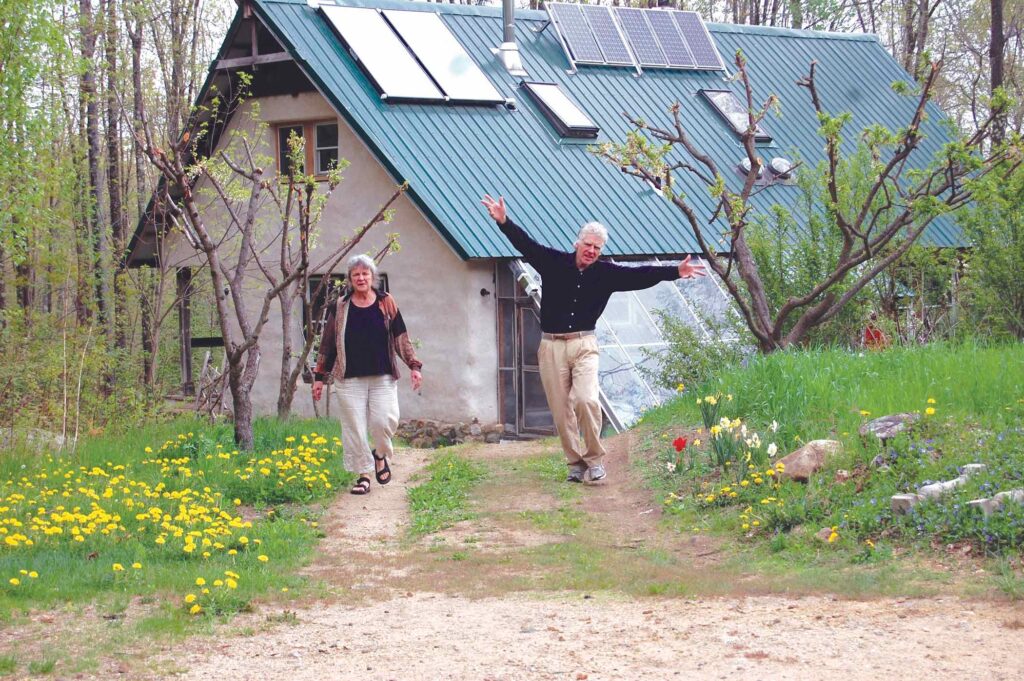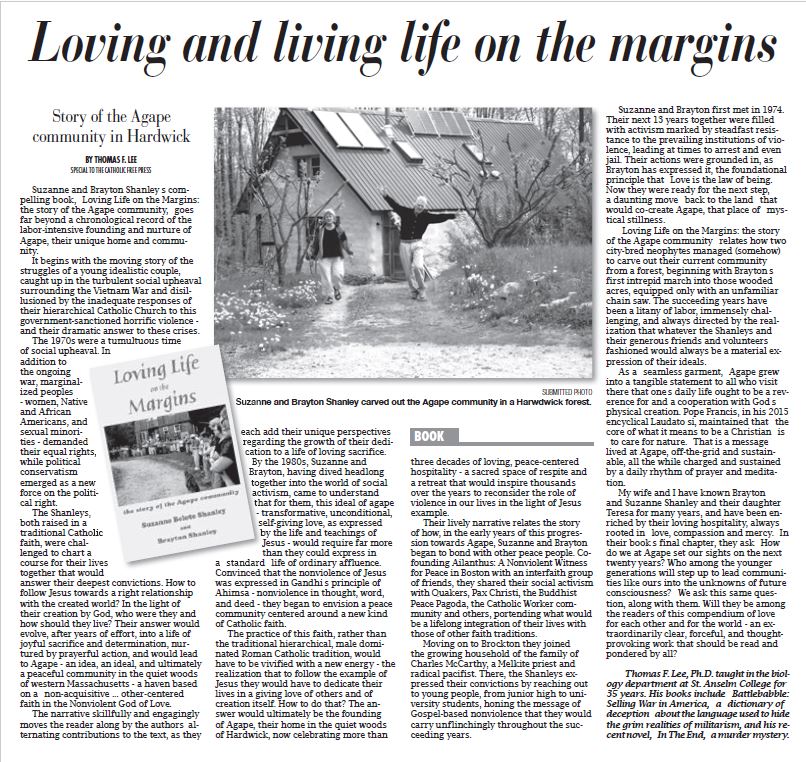 by Suzanne Belote Shanley and Brayton Shanley
by Suzanne Belote Shanley and Brayton Shanley
Reviewed by Thomas Lee, PhD, retired professor, St. Anselm College
Suzanne and Brayton Shanley’s compelling book, Loving Life on the Margins: the story of the Agape community goes far beyond a chronological record of the labor-intensive founding and nurture of Agape, their unique home and community.
It begins with the moving story of the struggles of a young idealistic couple, caught up in the turbulent social upheaval surrounding the Vietnam War and disillusioned by the inadequate responses of their hierarchical Catholic Church to this government-sanctioned horrific violence – and their dramatic answer to these crises.
The 1970s were a tumultuous time of social upheaval. In addition to the ongoing war, marginalized peoples – women, Native and African Americans, and sexual minorities – demanded their equal rights, while political conservatism emerged as a new force on the political right.
The Shanleys, both raised in a traditional Catholic faith, were challenged to chart a course for their lives together that would answer their deepest convictions. How to follow Jesus towards a right relationship with the created world? In the light of their creation by God, who were they and how should they live? Their answer would evolve, after years of effort, into a life of joyful sacrifice and determination, nurtured by prayerful action, and would lead to Agape – an idea, an ideal, and ultimately a peaceful community in the quiet woods of western Massachusetts – a haven based on a “non-acquisitive…other-centered faith in the Nonviolent God of Love.”
The narrative skillfully and engagingly moves the reader along by the authors’ alternating contributions to the text, as they each add their unique perspectives regarding the growth of their dedication to a life of loving sacrifice.
By the 1980s, Suzanne and Brayton, having dived headlong together into the world of social activism, came to understand that for them, this ideal of agape – transformative, unconditional, self-giving love, as expressed by the life and teachings of Jesus – would require far more than they could express in a “standard” life of ordinary affluence. Convinced that the nonviolence of Jesus was expressed in Gandhi’s principle of Ahimsa – nonviolence in thought, word, and deed – they began to envision a peace community centered around a new kind of Catholic faith.
The practice of this faith, rather than the traditional hierarchical, male dominated Roman Catholic tradition, would have to be vivified with a new energy – the realization that to follow the example of Jesus they would have to dedicate their lives in a giving love of others and of Creation itself. How to do that? The answer would ultimately be the founding of Agape, their home in the quiet woods of Hardwick, Massachusetts, now celebrating more than three decades of loving, peace-centered hospitality – a sacred space of respite and a retreat that would inspire thousands over the years to reconsider the role of violence in our lives in the light of Jesus’ example.
Their lively narrative relates the story of how, in the early years of this progression towards Agape, Suzanne and Brayton began to bond with other peace people. Co-founding Ailanthus: A Nonviolent Witness for Peace in Boston with an interfaith group of friends, they shared their social activism with Quakers, Pax Christi, the Buddhist Peace Pagoda, the Catholic Worker community and others, portending what would be a lifelong integration of their lives with those of other faith traditions.
Moving on to Brockton, MA they joined the growing household of the family of Charles McCarthy, a Melkite priest and radical pacifist. There, the Shanleys expressed their convictions by reaching out to young people, from junior high to university students, honing the message of Gospel-based nonviolence that they would carry unflinchingly throughout the succeeding years.
Suzanne and Brayton first met in 1974. Their next thirteen years together were filled with activism marked by steadfast resistance to the prevailing institutions of violence, leading at times to arrest and even jail. Their actions were grounded in, as Brayton has expressed it, the foundational principle that “Love is the law of being.” Now they were ready for the next step, a daunting move “back to the land” that would co-create Agape, that place of “mystical stillness.”
Loving Life on the Margins: the story of the Agape community relates how two city-bred neophytes managed (somehow) to carve out their current community from a forest, beginning with Brayton’s first intrepid march into those wooded acres, equipped only with an unfamiliar chain saw. The succeeding years have been a litany of labor, immensely challenging, and always directed by the realization that whatever the Shanleys and their generous friends and volunteers fashioned would always be a material expression of their ideals.
As a “seamless garment”, Agape grew into a tangible statement to all who visit there that one’s daily life ought to be a reverence for and a cooperation with God’s physical Creation. Pope Francis, in his 2015 encyclical Laudato si, maintained that “the core of what it means to be a Christian” is “to care for nature.” That is a message seldom heard from preachers’ pulpits, but it is lived at Agape- off the grid and sustainable, all the while charged and sustained by a daily rhythm of prayer and meditation.
My wife and I have known Brayton and Suzanne Shanley and their daughter Teresa for many years, and have been enriched by their loving hospitality, always rooted in “love, compassion and mercy.” In their book’s final chapter, they ask “How do we at Agape set our sights on the next twenty years? Who among the younger generations will step up to lead communities like ours into the unknowns of future consciousness?” We ask this same question, along with them. Will they be among the readers of this compendium of love for each other and for the world – an extraordinarily clear, forceful, and thought-provoking work that should be read and pondered by all?
Thomas F. Lee, Ph.D. taught in the Biology Department at Saint Anselm College for 35 years. His books include Battlebabble: Selling War in America, a “dictionary of deception” about the language used to hide the grim realities of militarism, and his recent novel, In The End, a murder mystery centered around the current controversies in the Catholic Church.

